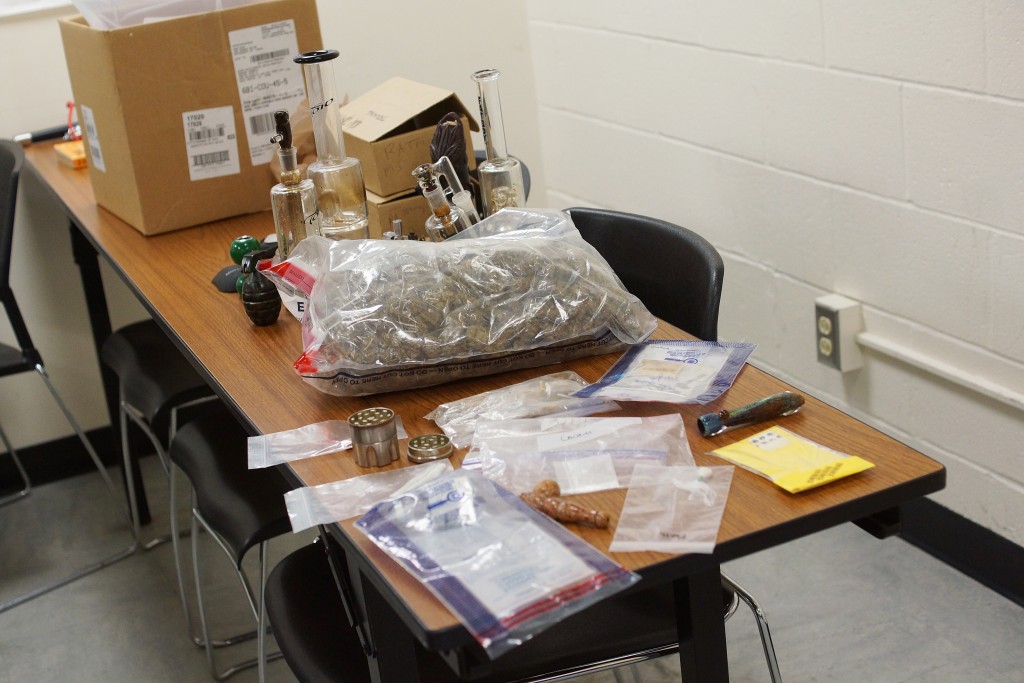
At Binghamton University, the police evidence room contains what appears to be a stack of poker chips and a computer mouse. Although these seem like strange and somewhat innocuous things for officers to confiscate, these items are not what they appear to be. Upon further inspection, the poker chips are actually a marijuana grinder and the computer mouse is a scale.
The evidence room within the Binghamton University Police Station is full of drug paraphernalia — from large bongs to grinders shaped like grenades — all confiscated on BU’s campus or during traffic stops which the University Police Department has sponsored or assisted with.
Officer Mark Silverio of Binghamton’s New York State University Police said that some of the items they seize are somewhat complicated contraptions.
“These multi-chamber ones — [students] pay a lot of money for them,” Officer Silverio said. “I don’t know if it increases your high or makes it any better. When I was in high school, there was pipes and bongs. Now, we recover these things that are like seven chambers of stuff before [the drug] gets to the actual person smoking.”
Drugs such as marijuana, cocaine, ketamine and Molly have been confiscated from students.
“When we confiscate this stuff, obviously we don’t want to give it back,” explained Investigator Patrick Reilly.
Every couple of months, officers do a “drug burn,” an EPA-regulated process which involves going to a heating plant and burning all of the drugs that served as evidence in now-closed court cases.
College is a time to learn and the police officers embrace their roles not only as enforcers, but teachers as well. They save evidence bags of Molly, heroin, meth and other drugs to show resident assistants what the drugs look like, as many don’t know what to look for.
“Sometimes they’ll walk right by this and see it on a desk and not have any idea that that’s something that they need to be concerned about,” Silverio said.
Most of the drug-related charges given out on campus are related to marijuana possession, because it is easy to identify it by the smell. From Jan. 1 through April 15, there were 68 marijuana-related objects confiscated alone. However, many of the drugs being used on campus don’t produce a smell when they are being used, so it’s harder to find them.
“If somebody’s doing cocaine in their room, there’s no indication in the hallway that someone’s doing cocaine in their room,” Silverio said. “You know when somebody’s smoking weed. So a lot of the other drugs come from marijuana complaints or from traffic stops.”
As a trend, UPD tends to see new drugs on campus before they are seen out in the community. One example of this phenomenon is the use of “weed paste,” which has made its way from dorm rooms to State Street and out into the Binghamton community.
“Everything [drugwise] that’s out there is here,” Silverio said. “The students coming back and forth from the city are great ways to get drugs back up to Binghamton. You’ve seen a couple in the paper here recently, a couple of the fraternities Downtown have gotten pinched and that’s what they’re doing, they’re muling drugs from New York City up to Binghamton.”
For the most part, drug-related charges are dealt with through the Student Conduct Board, as opposed to in court.
“Each officer, it’s their discretion if they want to arrest you,” Reilly said. “If you’re being an asshole, then I’m going to be an asshole back. And me being an asshole back is going to be worse.”


